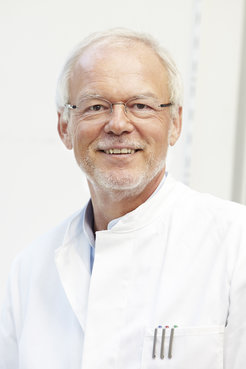GAGNA A. & Ch. VAN HECK Prize - 2018

The « GAGNA A. & Ch. VAN HECK Prize », amounting to 75,000 EUR, is intended to reward every three years a scientist or a physician, Belgian or foreigner, whose work has contributed to the treatment of a currently incurable disease, or has provided an outstanding contribution to basic research, resulting into such discovery. This Prize was awarded for the first time in 2003 and represents one of the most prestigious Belgian scientific Prizes in the biomedical field.
For 2018, this Prize is awarded to Stefan H.E. Kaufmann, of the Max Planck Institute for Infection Biology in Berlin, Germany, for his pioneering contributions to the understanding of the function of T-lymphocytes, myeloid cells and cytokines in infections caused by intracellular bacteria. This work opens new perpectives in the control of tuberculosis and has resulted in the development of a vaccine which is now in the last stage of clinical development.
Tuberculosis can be cured by chemotherapy. However, this treatment is complex, requiring a combination of four drugs administered for a long period of time. Furthermore, multi-drug resistance to the most effective drugs is now observed in hundreds of thousands of patients worldwide. Although a vaccine — bacille Calmette-Guérin (BCG) — against tuberculosis exists, it only protects against severe forms of childhood tuberculosis, but not against the major form of the disease, pulmonary tuberculosis. There is a general agreement that not only new drugs but also new therapeutic approaches are needed for a disease that is becoming again life-threatening for millions of people, causing 1.6 million deaths in 2016.
Dr Kaufmann made numerous outstanding contributions in the field of cellular immunology to bacterial infections. One of his most important findings is the identification of the role of CD8-T lymphocytes in protection against intracellular bacterial infections. He and his group also elucidated the antigen presentation pathways for CD8 T-cell stimulation in bacterial infections and identified cross-priming as a critical step in this process. These findings have formed the basis for the development of a new vaccine against tuberculosis. Unlike BCG, which induces a CD4 T-cell response, the new recombinant vaccine elaborated by Dr Kaufmann and coworkers has been constructed in such a way that it induces a broader T cell response, involving both CD4- and CD8-T cells. A multicentric Phase II/III clinical trial on 2000 subjects has started this year (2018) in India, a country with high tuberculosis endemicity. This study targets prevention of recurrence of tuberculosis in patients who had seemingly been cured by drug treatment. Furthermore, future vaccine trials will benefit from biosignatures of tuberculosis risk which has been defined by a large international north-south network, initiated by Dr Kaufmann and supported by the Bill & Melinda Gates foundation.
Born in 1948 in Ludwigshafen, Dr Kaufmann obtained his PhD at the University of Mainz in 1977 and his habilitation in Microbiology and Immunology in 1981 at the Free University of Berlin. He has published more than 900 articles in international journals and is among the most highly cited researchers in immunology. He is the founding director and a member of the Max Planck Institute for Infection Biology in Berlin, for which he acted for several terms as managing director. He is frequently invited to participate in national and international meetings and has received prestigious awards and distinctions. He is a highly active leader of the immunological community and a strong advocate of public awareness of the role of science in society.
In conclusion, the « GAGNA A. & Ch. VAN HECK Prize - 2018 », is awarded to an outstanding immunologist, who made groundbreaking contributions to the understanding of the immunological response to bacterial pathogens. These discoveries lead to very promising therapeutic perspectives for better control of tuberculosis.
